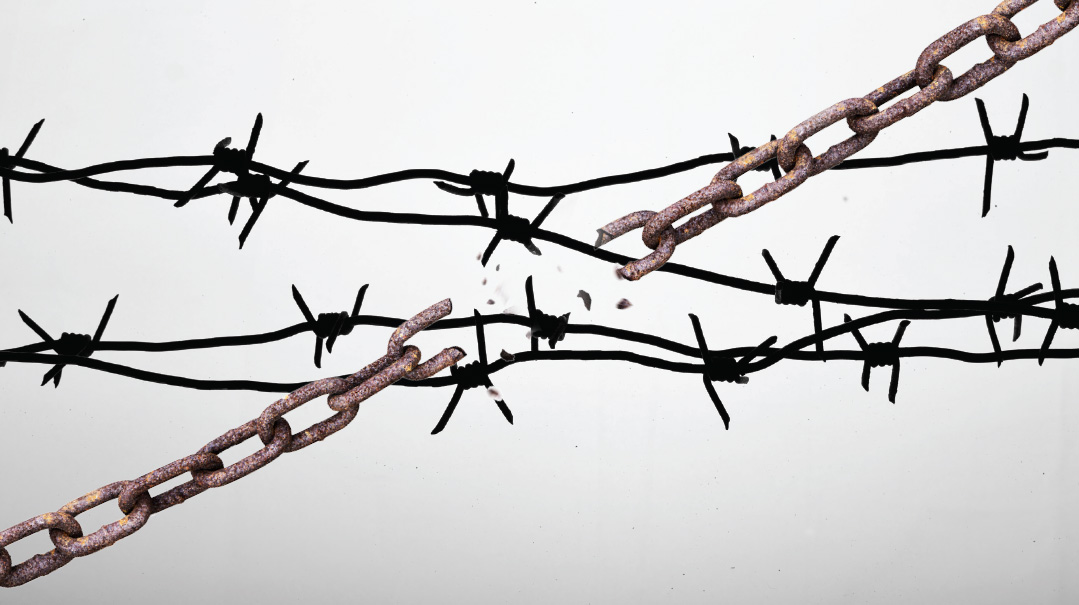Here It Stops
| September 20, 2022I grew up hardly seen. Hardly heard. Hardly spoken to, unless it was to be criticized

It’s an ordinary Tuesday night in May and I am frozen, horrified by what I have just done. Did I really just push my daughter? Me?!
I am more stunned than she is. This isn’t the way it was supposed to be. I’m Super-Stay-At-Home Mom! I give my kids everything and anything I can! Where did this go wrong?
I am a 3G, that is, the granddaughter of Holocaust survivors. You hear a lot about Survivors. Survivors, who despite all they lost, all they went through, retained their emunah and their simchas hachayim. Survivors who built institutions from nothing, prosperity from pennilessness. Who were bastions of Torah and chesed. Survivors who built healthy, happy families that spread Torah and light throughout the world. These were great people — unimaginably great.
But they weren’t the only survivors. There were those who were ravished by the Holocaust, their joy extinguished, never to be reignited. These Survivors limped through life, their inner wounds etched on their hearts as indelibly as the numbers on their arms.
And then there were those who picked up as many pieces of their shattered lives as they could, but try as they might, couldn’t put Humpty Dumpty together again. My grandparents fell into that category. They were unquestionably great people. They built yeshivos and mikvaos and businesses and wealth. They remained inexplicably steadfast in their emunah. They davened for the amud and baked honey cookies and hosted lively Purim seudos.
But that doesn’t mean the lives they built were peaceful. My mother — their daughter —certainly didn’t have an idyllic life. Her Survivor parents fought. A lot. The pain they couldn’t express came out in biting words.
At ten, my mother became mother to her siblings, as my grandmother battled depression, a disorder she did not have the vocabulary to name. My mother persevered, a young girl nearly as bereft of a mother as her own mother had been, until she turned 20. Then, to get out of the house, she did the natural thing. She married.
Badly.
My paternal grandparents’ story is murky, but I know this: they escaped the inferno with no family but each other. Was there mental illness in the family before the war? Was my father, an only son after five girls, wrecked by spoiling? I’ll never know. This much is clear: My father suffered from a personality disorder. Or, perhaps I should say, our family suffered from my father’s personality disorder.
It was my mother who suffered most, escaping the lion’s den by diving into a shark tank. She spent the 20-odd years until my father’s death focused on surviving. She remained a good person. Graceful and poised and enjoying the admiration of her peers. But much as she wanted to, my mother couldn’t give her children what she hadn’t received herself. I grew up hardly seen. Hardly heard. Hardly spoken to, unless it was to be criticized.
None of this registered until I myself was old enough to marry. I had thought of my childhood as pretty close to perfect. After all, I had nice clothes, warm food, a comfortable house — even my own room. I went to camp during the summer and to Florida or Colorado in the winter.
But at 19, I was battling depression and could not understand why. I started therapy and traveled deep inside myself to heal wounds I didn’t know I had. I emerged enlightened and wiser, and I vowed to myself that I would be that unicorn among women — a perfect mother. I would stay home with my kids. I would focus on them and speak to them and hug them and love them and know them.
Then I pushed my daughter, and decimated my equilibrium. What had I become? What was this alien fury that churned inside of me? She was stubborn, my daughter, but only three!
Miserable thoughts swirled through my mind. I’m a failure. I’ve become the one thing I feared most. My children are doomed. They’ll be as damaged as I am, hugs and kisses and attention and praise notwithstanding.
Suddenly, without even realizing it, I yelled, “No!”
My daughter jumped, but I wasn’t addressing her. I was addressing myself. I would not let this happen. I would not destroy my children. I would wrest this demon out of my person and grind it to dust.
The buck stops here.
I will not pass it on.
From generation to generation.
Like some mother-of-all-bombs.
I was back in therapy the next week. It took time, a long time. And hard work. But I was determined. I went deeper. Healed more. And after years of toil, I did it. I became the mother I dreamed of being. My home became calm. Relaxed. Happy.
It’s been years since that Tuesday, and I am a changed mother, as unrecognizable as if I had lost 200 pounds. Actually, what I lost was heavier: the anger, pain, and guilt that had been imprisoned inside me. My children are growing up in a warm and healthy home with shalom bayis and love. Some have already gone on to start families of their own.
Watching them with their children, I know the shackles have been broken for good. They have a new chain to link to now.
And that chain starts with me.
(Originally featured in Family First, Issue 811)
Oops! We could not locate your form.

